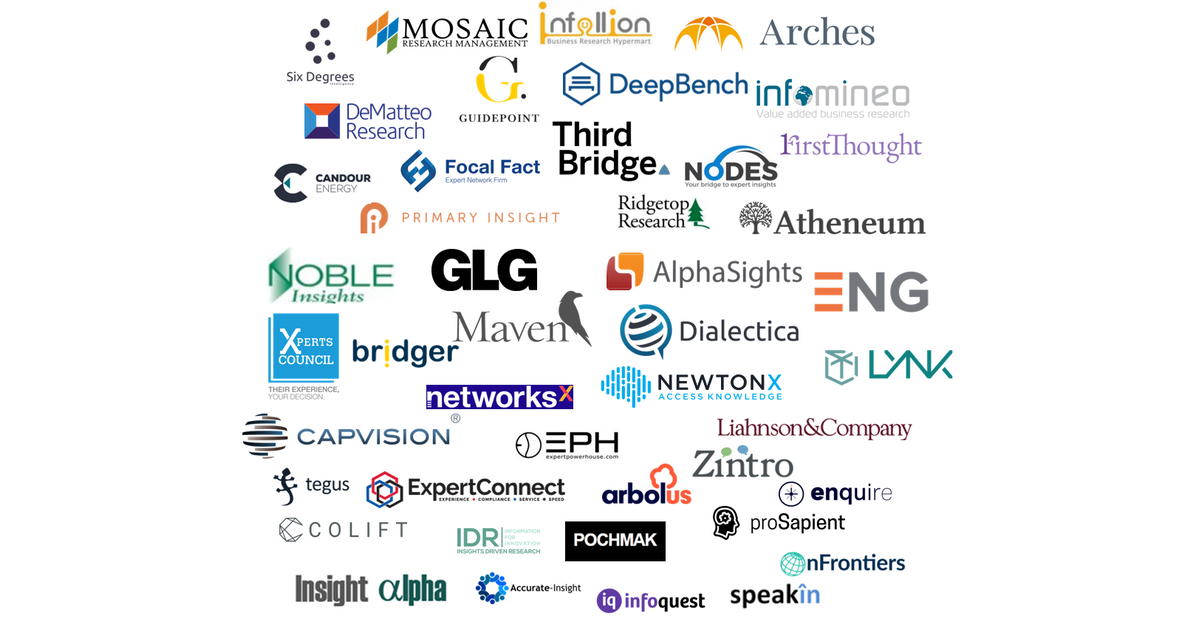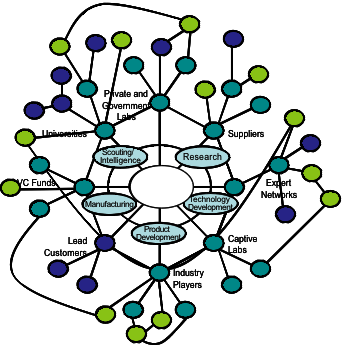What Do Expert Networks Do?
What do expert networks do? Well, let me break it down for you! Expert networks are like a secret society of knowledge where professionals from various fields come together. They connect people who need answers, guidance, or insights with experts who have the know-how and experience.
These networks are like a superpower in the business world. They help decision-makers and investors gain valuable information by tapping into the expertise of industry professionals. Whether it’s finding the best investment opportunities, getting advice on a specific industry, or understanding market trends, expert networks are the go-to resource.
Think of it this way: expert networks are like a virtual treasure trove of information, where you can unlock valuable insights and gain a competitive edge. So, if you’re curious about the inner workings of expert networks and how they can benefit you, dive in and explore their fascinating world. Let’s get started!

What Do Expert Networks Do?
Expert networks play a crucial role in connecting professionals with industry expertise to individuals, businesses, and organizations seeking their knowledge. These networks provide a platform where experts can share their insights, provide guidance, and collaborate on various projects. Expert networks have emerged as a valuable resource for decision-makers looking to gain a competitive edge and make informed choices. In this article, we will dive deep into what expert networks do and explore their importance in different sectors and industries.
How Expert Networks Facilitate Knowledge Exchange
Expert networks act as intermediaries between professionals and those looking for their expertise. They create a platform that enables professionals to showcase their knowledge and connect with individuals or organizations seeking their insights. One of the primary ways expert networks facilitate knowledge exchange is through one-on-one consultations. Professionals offer their expertise through phone calls or video conferences, where they provide tailored advice, answer specific questions, and assist in decision-making. These consultations can range from short information-sharing sessions to in-depth discussions and ongoing collaborations.
In addition to consultations, expert networks also provide opportunities for knowledge sharing through events and conferences. They organize webinars, workshops, and seminars where experts deliver presentations, share case studies, and engage in discussions. These events allow professionals to expand their networks, stay updated with industry trends, and learn from one another’s experiences. Expert networks often curate these events based on specific topics or industries, ensuring that participants can gain valuable insights that are relevant to their needs.
Furthermore, expert networks facilitate knowledge exchange through their online platforms. These platforms serve as virtual hubs where professionals can showcase their expertise through profiles, publish articles or whitepapers, and engage in discussions with other members. The platforms typically have search functionalities that allow individuals or organizations to find experts based on their expertise, industry, or location. These online communities foster collaboration, mentorship, and knowledge sharing among professionals, leading to continuous learning and growth.
The Importance of Expert Networks in Different Sectors
Expert networks are valuable resources in a wide range of sectors and industries. Let’s explore a few examples to understand their importance:
Finance and Investment
In the finance and investment sector, expert networks are instrumental in providing accurate and timely information to traders, fund managers, and analysts. Professionals with expertise in specific markets, industries, or financial instruments can offer insights that help investors make informed decisions. These networks play a crucial role in reducing information asymmetry and increasing transparency in the financial world.
Expert networks in the finance sector also help professionals stay updated with regulatory changes, emerging technologies, and market trends. This knowledge is vital for individuals and organizations operating in a fast-paced and ever-changing industry.
Beyond the financial markets, expert networks are valuable for professionals seeking guidance on personal finance, retirement planning, and investment strategies. They connect individuals with financial advisors who can provide tailored advice based on their unique circumstances and goals.
Healthcare and Life Sciences
In the healthcare and life sciences sectors, expert networks are particularly crucial for medical professionals, researchers, and pharmaceutical companies. These networks connect doctors, scientists, and healthcare providers globally, allowing them to collaborate on research projects, discuss treatment options, and share best practices. The exchange of knowledge through expert networks helps accelerate medical advancements, improve patient outcomes, and enhance the overall quality of healthcare.
For pharmaceutical companies, expert networks enable them to gather insights from medical experts during the drug development and regulatory approval process. Experts can provide valuable feedback on clinical trials, potential side effects, and the overall efficacy of new drugs. This collaboration ensures that pharmaceutical companies can make evidence-based decisions and bring safe and effective treatments to the market.
Expert networks also serve as a resource for patients and their families looking for trusted healthcare providers, second opinions, or information about specific medical conditions. These networks connect individuals with experts who can guide them through their medical journeys and provide personalized advice.
The Benefits of Utilizing Expert Networks
When individuals or organizations tap into expert networks, they can reap numerous benefits:
Access to Specialized Knowledge
Expert networks provide access to professionals with specialized knowledge in various domains. Whether it’s legal advice, technological insights, or industry-specific expertise, these networks connect individuals with the right experts who can address their specific needs. Accessing such specialized knowledge can save time, reduce risks, and lead to better decision-making.
Real-Time Information and Insights
By engaging with experts through consultations, events, or online platforms, individuals or organizations can gain real-time information and insights. This up-to-date knowledge allows them to adapt to changing circumstances, stay ahead of their competitors, and make informed choices. Expert networks provide a valuable channel for receiving timely advice that can impact business strategies, investment decisions, and personal growth.
Expand Professional Networks
Engaging with expert networks allows individuals to expand their professional networks. By connecting with experts in their fields of interest, individuals can form valuable relationships, seek mentorship, and explore opportunities for collaboration. These expanded networks can open doors to new partnerships, career advancements, and personal growth.
Cost-Effective Solutions
Instead of hiring expensive consultants or conducting extensive research, utilizing expert networks can provide cost-effective solutions. Consultations or access to expert knowledge through these networks are often more affordable than traditional consulting services. This affordability enables smaller businesses and individuals to access expertise that would otherwise be out of their reach.
Efficiency and Convenience
Expert networks offer a convenient and efficient way to access expert knowledge. With online platforms and remote consultations, individuals can connect with experts from anywhere in the world without the need for travel or lengthy appointment scheduling processes. This efficiency allows individuals to seek advice when they need it most, eliminating unnecessary delays and enabling quick decision-making.
Tips for Leveraging Expert Networks
Here are some tips to help individuals and organizations make the most out of their experience with expert networks:
Clearly Define Objectives
Before engaging with an expert network, it’s important to clearly define your objectives and the specific information or insights you are seeking. This clarity will help you identify the right experts to engage with and ensure that your consultations or interactions are focused and effective.
Prepare Relevant Questions
When engaging in consultations or discussions with experts, it’s helpful to prepare relevant questions in advance. This preparation ensures that you make the most out of your time with the expert and gather the specific information you need. Thoughtful and well-prepared questions can lead to more insightful conversations and actionable advice.
Build Long-Term Relationships
Expert networks provide opportunities to build long-term relationships with professionals in your field of interest. By nurturing these relationships and staying connected with experts, you can continue to access their insights, collaborate on projects, and benefit from ongoing mentorship. Building long-term relationships helps create a mutually beneficial network of support and knowledge exchange.
Conclusion
Expert networks serve as valuable resources for individuals, businesses, and organizations looking to tap into specialized knowledge and gain insights from industry experts. These networks facilitate knowledge exchange through consultations, events, and online platforms, fostering collaboration and continuous learning. Expert networks play a critical role in various sectors, such as finance, healthcare, and beyond, by connecting professionals with the expertise needed to make informed decisions.
By utilizing expert networks, individuals and organizations can access specialized knowledge, gain real-time information, expand their professional networks, find cost-effective solutions, and enjoy efficiency and convenience. To make the most of their experience with expert networks, it’s important to clearly define objectives, prepare relevant questions, and nurture long-term relationships.
So, whether you’re a decision-maker looking for expert advice or an expert seeking to share your knowledge, expert networks are a valuable tool in today’s fast-paced and interconnected world.
Key Takeaways: What do expert networks do?
- Expert networks connect professionals with specialized knowledge to individuals or companies in need of their expertise.
- These networks provide access to industry experts in various fields, allowing users to gain insights, make informed decisions, and solve complex problems.
- Expert networks offer services such as expert consultations, market research, due diligence, and expert witness testimonies.
- They facilitate direct communication between experts and clients through phone calls, video conferences, or in-person meetings.
- Expert networks can be useful for businesses, investors, law firms, researchers, and individuals seeking expert advice and market intelligence.
Frequently Asked Questions
Welcome to our expert networks Q&A session! Here, we’ll be answering some common questions about what expert networks do and how they can benefit you or your business. Check out the questions below to learn more.
1. How do expert networks connect professionals with industry insights?
Expert networks act as a bridge between professionals seeking knowledge and industry experts who can provide valuable insights. These networks maintain a vast database of experts from various fields, such as finance, technology, or healthcare. When someone in need of information approaches the network, it connects them with the most suitable expert or a relevant group of experts.
Professionals can then engage in one-on-one consultations, group discussions, or even attend events where they can learn directly from the experts. This connection helps professionals gain industry-specific knowledge, get answers to their questions, and make informed decisions in their respective fields.
2. Why should I consider using expert networks?
Expert networks offer a myriad of benefits that can greatly impact your personal or professional growth. By utilizing expert networks, you gain access to highly specialized knowledge and industry insights that can be difficult to obtain otherwise. This knowledge can help you make informed decisions, stay updated with the latest industry trends, and gain a competitive edge.
Additionally, expert networks offer a convenient and efficient way of connecting with industry experts. Rather than spending countless hours searching for experts on your own, expert networks streamline the process and connect you directly with the right professionals. This saves you time and effort, allowing you to focus on other important tasks while still acquiring valuable knowledge.
3. Can expert networks help startups and small businesses?
Absolutely! Expert networks are not just limited to large corporations or established businesses. In fact, startups and small businesses can benefit greatly from utilizing expert networks. These networks provide access to industry experts who can offer guidance and assistance on various aspects of running a business, including strategy, marketing, finance, and more.
For startups and small businesses, expert networks can be an invaluable resource for gaining industry expertise without the need to hire full-time staff in every area. By connecting with experts on an as-needed basis, businesses can save costs while still benefiting from the knowledge and insights of experienced professionals.
4. Are expert networks only for professionals or can individuals also benefit from them?
While expert networks primarily cater to professionals and businesses, individuals can also benefit from them in various ways. For example, if you’re looking to enter a new field or embark on a personal project, expert networks can connect you with professionals who can guide you and provide insights specific to your goals.
Whether you’re looking for advice on career choices, personal development, or pursuing a passion project, expert networks can connect you with the right experts who can offer valuable guidance and support. These networks allow individuals to tap into the expertise of professionals, opening doors to new opportunities and facilitating personal growth.
5. Can expert networks be used for academic purposes?
Absolutely! Expert networks can be a treasure trove of knowledge for students, researchers, and academics. These networks often have experts who specialize in various academic fields, and they can provide unique insights, valuable data, and academic guidance.
Whether you’re working on a research project, writing a thesis, or simply looking for expert opinions on a subject, expert networks can connect you with professionals who can help you navigate through the academic landscape. By leveraging the expertise within these networks, students and researchers can enhance their knowledge and produce more comprehensive and impactful academic work.
Expert Networks explained in under 3 minutes!
Summary
So, let’s wrap up what expert networks do in simple words. Expert networks are companies that connect people who need information with experts who have that information. These experts can provide insights on various topics, from technology to healthcare.
By using expert networks, businesses can make better decisions based on reliable and up-to-date knowledge. It’s like having a direct line to experts who can help you understand complex subjects. Expert networks play an important role in helping people access expertise and making the world of knowledge more accessible to everyone.


